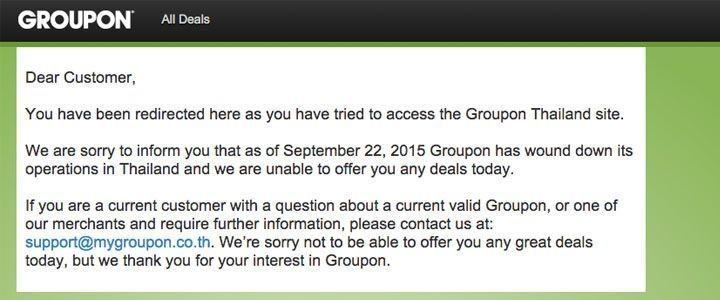Tuesday was a sad day. Daily deal giant Groupon announced it will lay off 1,100 employees and shut down operations completely in 7 countries. It’s never pretty to see a giant stumble, but in this case many saw it coming: After the initial global Groupon craze and the $13 billion IPO, over time many observers repeatedly pointed out flaws in the business model.
Global headaches for Groupon
As the novelty of the daily deal model wore off, many have talked of a growing “deal fatigue” among consumers that lowers re-purchase rates and thus customer lifetime value. Perhaps even more important, however, are the sales cost of keeping the “deal factory” for local deals running: Having sales reps talk to little spas and restaurants to get deals on the page is a considerable expense. It certainly does not help that local businesses seem to increasingly call into question the value that customers sent by Groupon have to them as studies claim that only few of them turn into regulars for the local business.
Groupon in turn reacted to these concerns by increasingly pushing into ecommerce and selling products on its page. It also seems they worked hard to increase efficiency by harmonizing processes and technology platforms across countries. The required additional investment to bring these improvements to more countries is also part of the official reasoning given by Groupon for why it decided to close shop in 7 countries.
Still, looking at the list of 7 countries, you can’t help but wonder why Southeast Asia is affected disproportionately with 2 countries, Thailand and the Philippines.
Why Thailand and the Philippines?
Of course, the internal reasons for why operations in certain countries rather than others were chosen to be discontinued will likely never be fully disclosed. For me, as a Groupon customer in Thailand, the news definitely came suddenly. It will be a bittersweet moment when I use my last 2 Groupons in Bangkok (yes, you can still use them until expiry or alternatively ask for a refund).
Personally, I can’t help but be familiar with the space: Even though it works very differently, my own startup, the coupon website Dealsheep.com, sometimes gets confused for a Groupon clone, simply because, well, there is a “deal” in the name and it involves coupons. Because of that I have some perspective on what may have made Thailand, and perhaps to some extent the Philippines, a uniquely challenging market.
First of all, of course, the elephant in the room: Groupon faced formidable local competitors in both of these markets. Ensogo in Thailand and Metrodeal in the Philippines launched before Groupon arrived. Up until the shutdown on Tuesday, both defended their lead as their traffic eclipsed that of Groupon as Alexa and Similarweb data show. One likely reason is the degree of local adaption, from payment options to Line stickers. I imagine it must be really really hard for a local Groupon subsidiary to knock at the global headquarters’ doors and ask for a budget for cutesy stickers for a messaging app; but Ensogo does have Line stickers, a must-have for consumer internet companies in Thailand.
Cultural factors are at play elsewhere, too. Email marketing is one of Groupon’s most effective and important channels globally. For many Thais, however, email is much less central to their life. Instead they would rely on Facebook or Line in many situations. It may be that at least initially, Ensogo was able to leverage other channels like social media, word-of-mouth and even offline-advertising more effectively.
Last but not least, it is unclear how successful daily deal websites have been in making the move from local deals to featuring more products. While Coupang apparently had considerable success with that strategy in Korea, it seems like in Thailand local deals especially for nation-wide food chains continue to outshine product deals in popularity. Part of the reason may be that those product deals mainly featured unbranded gadgets initially.
What comes next?
Of course, the struggles of daily deal websites most likely won’t mean the end of discounts. It may be that shoppers are increasingly getting familiar with other concepts like price comparison, discount coupon code, or even cash-back websites when it comes to products. For local commerce in the restaurant space, Thai startup Eatigo has gone as far as calling itself the Anti-Groupon: With time-based discounts that channel eaters into the off-peak hours when tables are empty, it may have the more attractive value proposition for restaurants.
What do you think? Did the Groupon news come as a surprise to you? Do you think Groupon will come out stronger of this consolidation? Or do you think the daily deal model itself is past its heyday?
